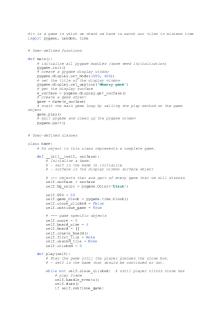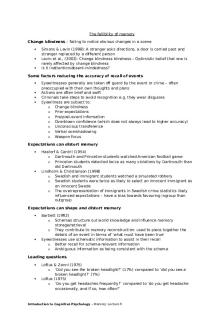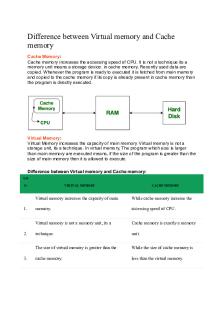Memory Psych PDF

| Title | Memory Psych |
|---|---|
| Author | Gillian Belkin |
| Course | General Psychology |
| Institution | The College of New Jersey |
| Pages | 1 |
| File Size | 48.1 KB |
| File Type | |
| Total Downloads | 73 |
| Total Views | 152 |
Summary
Questions about Memory, Psychology Textbook (Myers)...
Description
1. Identify the three-box model of memory a. We first record to-be-remembered information as a fleeting sensory memory. b. From there, we process information into short-term memory, where we encode it through rehearsal. c. Finally, information moves into long-term memory for later retrieval. (299) 2. What is encoding? a. The process of getting information into the memory system (298) 3. Explain rehearsal: repeating information over and over again in the brain a. Mental rehearsal: b. Short term rehearsal: 4. What was the purpose of Ebbinghaus’ use of nonsense syllables Ebbinghaus found that the more times he practiced a list of nonsense syllables on Day 1, the less time he required to relearn it on Day 2. The speed of relearning is one measure of memory retention. (From Baddeley, 1982.) 5. Explain long term potentiation An increase in a cell’s firing potential after brief, rapid stimulation; a neural stimulus for learning and memory (311) 6. Differentiate between recall and recognition (types of memory assessment) a. Recall- a measure of memory in which the person must retrieve information learned earlier… ex). Fill in the blank test (297) b. Recognition- a measure of memory in which the person identifies items previously learned… ex). Multiple choice test (297) 7. Discuss the serial position effect a. Our tendency to recall best the last and first items in a list (313) 8. Identify the terms misinformation effect and source amnesia a. Misinformation effect- occurs when misleading information has corrupted one’s memory of an event (322) b. Source amnesia- faulty memory for how, when, or where information was learned or imagined (322) c. Together they are at the heart of many false memories 9. Discuss both types of interference a. Proactive interference: the forward-acting disruptive effect of older learning on the recall of new information. (319) b. Retroactive interference: the backward-acting disruptive effect of newer learning on the recall of old information. (319) 10. What are flashbulb memories a. A clear memory of an emotionally significant moment or event (308)...
Similar Free PDFs

Memory Psych
- 1 Pages

Gen Psych - Memory
- 7 Pages

Psych Reflection Paper 2 Memory
- 3 Pages

Memory
- 3 Pages

Memory
- 5 Pages

Virtual Memory
- 58 Pages

CACHE MEMORY
- 1 Pages

Virtual Memory
- 17 Pages

Memory notespack
- 16 Pages

Memory Management
- 5 Pages

9.) Memory
- 4 Pages

Nondeclarative Memory
- 3 Pages
Popular Institutions
- Tinajero National High School - Annex
- Politeknik Caltex Riau
- Yokohama City University
- SGT University
- University of Al-Qadisiyah
- Divine Word College of Vigan
- Techniek College Rotterdam
- Universidade de Santiago
- Universiti Teknologi MARA Cawangan Johor Kampus Pasir Gudang
- Poltekkes Kemenkes Yogyakarta
- Baguio City National High School
- Colegio san marcos
- preparatoria uno
- Centro de Bachillerato Tecnológico Industrial y de Servicios No. 107
- Dalian Maritime University
- Quang Trung Secondary School
- Colegio Tecnológico en Informática
- Corporación Regional de Educación Superior
- Grupo CEDVA
- Dar Al Uloom University
- Centro de Estudios Preuniversitarios de la Universidad Nacional de Ingeniería
- 上智大学
- Aakash International School, Nuna Majara
- San Felipe Neri Catholic School
- Kang Chiao International School - New Taipei City
- Misamis Occidental National High School
- Institución Educativa Escuela Normal Juan Ladrilleros
- Kolehiyo ng Pantukan
- Batanes State College
- Instituto Continental
- Sekolah Menengah Kejuruan Kesehatan Kaltara (Tarakan)
- Colegio de La Inmaculada Concepcion - Cebu



